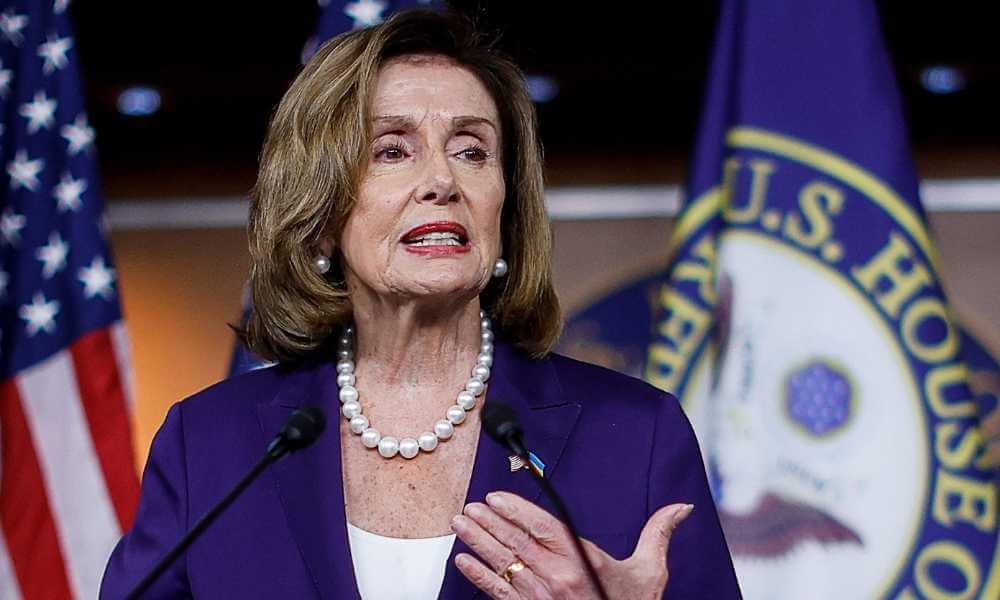
U.S. House of Representatives Speaker Nancy Pelosi plans to visit Taiwan in August, the Financial Times reported, citing six people familiar with the matter.
The plans come as Taiwan faces pressure from China as the latter considers democratically ruled Taiwan its own territory and the subject is a constant source of friction between Beijing and Washington.
There were divisions in the U.S. administration over whether Pelosi should visit Taiwan, the FT quoted two people familiar with the situation as saying.
Pelosi's office and the U.S. State Department did not immediately respond to a Reuters request for comment. The Taiwan embassy in the U.S. could not be reached immediately.
There has been intense speculation that she may visit the self-ruled island. Taiwan is claimed by China - which has warned of "serious consequences" if she goes there. No high-ranking US elected official has visited Taiwan in 25 years.
Ms Pelosi, a California Democrat, tweeted that the six-person Congressional delegation tour would seek to "reaffirm America's unshakeable commitment to our allies and friends in the region".
Her office said the tour was to the "Indo-Pacific region" - "including" visits to Singapore, Malaysia, South Korea and Japan.
China sees Taiwan as a breakaway province that must become a part of the country. Beijing has not ruled out the possible use of force to achieve this in the future.
Chinese officials have expressed anger over what they view as growing diplomatic engagement between Taipei and Washington. There was a surprise visit to the island by six US lawmakers in April.
The US has formal diplomatic ties with China, and not Taiwan.
Ms Pelosi has long been a vocal critic of the Chinese leadership, denouncing its human rights record. She has met pro-democracy dissidents and visited Tiananmen Square to commemorate victims of the 1989 massacre.
China has warned of "serious consequences" if Ms Pelosi were to proceed with her visit.
Second in line to the presidency, after the vice-president, Ms Pelosi would be the highest ranking US politician to travel to the island since 1997.
This rankles China, which sees self-ruled Taiwan as a breakaway province that must become a part of the country. Beijing has not ruled out the possible use of force to achieve this.
Even the Biden administration has reportedly tried to dissuade the California Democrat from going.
Last week, President Joe Biden told reporters "the military thinks it's not a good idea", but his White House has called Chinese rhetoric against any such trip "clearly unhelpful and not necessary".
The state department says Ms Pelosi has not announced any travel and the US approach to Taiwan remains unchanged.
While the US maintains what it calls a "robust, unofficial relationship" with Taiwan, it has formal diplomatic ties with China, and not Taiwan.
Ms Pelosi's trip, if it were to happen, also comes amid increased tensions between Washington and Beijing - and ahead of a much anticipated phone call between US President Joe Biden and Chinese leader Xi Jinping.
U.S. House of Representatives Speaker Nancy Pelosi starts a tour of four Asian countries on Sunday, her office said, without mentioning Taiwan amid intense speculation she might visit the self-ruled island claimed by China.
"Speaker Nancy Pelosi is leading a Congressional delegation to the Indo-Pacific region, including visits to Singapore, Malaysia, South Korea, and Japan," her office said in a statement.
It said the visit would include those countries, but did not specify whether Pelosi, who is number 3 in the line of presidential succession, might make other stops.
"The trip will focus on mutual security, economic partnership and democratic governance in the Indo-Pacific region," it said.
The deteriorating war of words between the U.S. and China over Taiwan “could easily escalate” and is being closely watched in European capitals, according to senior diplomats.
Tensions are growing between the world’s two biggest superpowers as Beijing ratchets up its threats over a possible visit by U.S. House Speaker Nancy Pelosi to Taiwan in the coming days.
From Brussels to Paris, EU officials have been reluctant to weigh into the dispute in public, even as China edges closer to the risk of a military standoff with the U.S. Behind the scenes, however, European diplomats accept there is clearly a danger that the situation could spiral out of control.